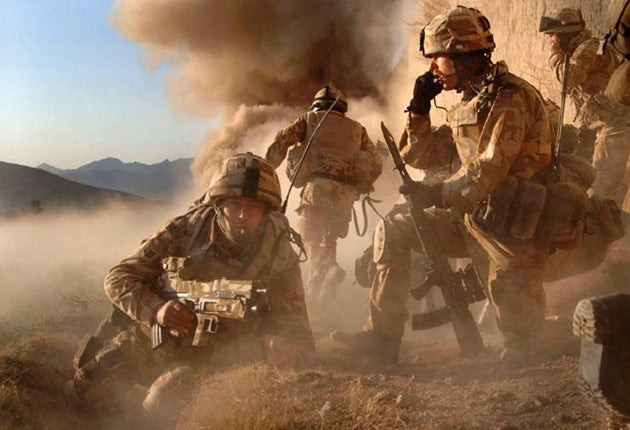Government split on need for Afghan troop reinforcements
Foreign Office accused of plotting against Ministry of Defence plan to send in more soldiers

British government policy towards Afghanistan has suffered from fundamentally divergent views between different ministries on how best to tackle the crisis, according to senior defence and diplomatic sources.
The Foreign Office (FCO) and the Department for International Development (DFID) are said to believe that sending more troops, the request that has been made by the military, is not the answer and might actually worsen the situation.
Attempts have been made to draw the various strands together under the Government's so-called "comprehensive approach", which emphasises the need for governance and reconstruction alongside combat operations.
However, tensions continue between the different government departments, and senior army officers are aggrieved because they believe the FCO and DFID "ganged up" with the Treasury when it successfully lobbied the Prime Minister against the request by commanders, and then Defence Secretary John Hutton, to send reinforcements of up to 2,500 troops to Afghanistan.
Gordon Brown agreed, instead, to the temporary deployment of 700 extra troops for the period of the Afghan elections scheduled for August.
One of Britain's most senior serving military commanders said yesterday: "No one in their right mind would ignore the importance of reconstruction in Afghanistan. But you must have security to have reconstruction and governance, and we don't think the FCO and DFID have quite got the equation right. We need more troops to ensure they can do their job."
Yesterday, the Foreign Secretary brushed aside complaints from senior generals that a lack of helicopters and troops was hindering the Afghan campaign. David Miliband said: "This is a mission that's been developed with a very clear strategy; above all, to make us safer here because we know these areas of Afghanistan and its neighbour Pakistan are used to launch terrorism around the world. We are not going to be able to do our mission in Afghanistan through tanks and helicopters alone. The great danger that our troops face is on the ground."
The British ambassador in Kabul, Mark Sedwill, said: "The UK effort in Afghanistan is unlike anything that the UK has done before. Our embassy in Kabul and the British-led civil military mission in Helmand are unprecedented. The UK is the biggest donor to the Afghan government, and has the second largest civilian and military presence in Afghanistan after the US."
Yesterday David Cameron challenged Gordon Brown to admit that a MoD request for extra forces had been turned down by the Government. The Prime Minister said: "In our discussions with the military, of course one talks about all the options that are available. We decided to increase the number of troops – that was after discussion with our military and President Obama from 8,100 to 9,000 and about 9,150."
However, the Prime Minister appeared to acknowledge the military's crucial complaint that a shortage of boots on the ground meant captured strategic Taliban positions could not be held, allowing the enemy to reoccupy the ground. He said that he had urged the Afghan President, Hamid Karzai, to provide more troops to ensure territory gained by Western forces is not recaptured by the insurgents.
The recriminations continued with David Owen, the former foreign secretary, calling for wholesale changes at the top for the Afghan mission with the former Nato secretary-general, George Robertson, brought in to oversee policy and General Sir David Richards, who was Nato commander in Afghanistan, taking over from Air Chief Marshal Sir Jock Stirrup, the Chief of Defence Staff. Sources close to General Richards said he was looking forward to his next posting, succeeding General Sir Richard Dannatt, as head of the Army and had no intention of attempting to supplant Sir Jock.
Meanwhile, in the Commons, the shadow Defence Secretary Liam Fox, asked the Defence Secretary why the Government had cut £1.4bn from the helicopter budget in 2004. Bob Ainsworth responded that there are now 60 per cent more helicopter frames and 84 per cent more helicopter hours.
Afghanistan: The rival approaches
*When British forces first deployed to Helmand in 2006, General Sir David Richards, then British commander of Nato forces in Afghanistan, wanted to set up secure areas where reconstruction could take place and governance developed.
Instead, UK forces were despatched to remote outposts to take on the Taliban; warfighting, rather than development, became the order of the day.
That summer, reconstruction was notably absent in Helmand and Kandahar, and villages turned into battlegrounds.
Since then, the Government has organised its "comprehensive approach", which is similar to the new US approach under General David Petraeus.
Huge amounts of British aid money are now pouring into Helmand and both the Foreign Office and DFID have a significant presence. However, as the issue of troop reinforcement shows, there are still differences in philosophy between the different ministries.
Kim Sengupta
Subscribe to Independent Premium to bookmark this article
Want to bookmark your favourite articles and stories to read or reference later? Start your Independent Premium subscription today.

Join our commenting forum
Join thought-provoking conversations, follow other Independent readers and see their replies